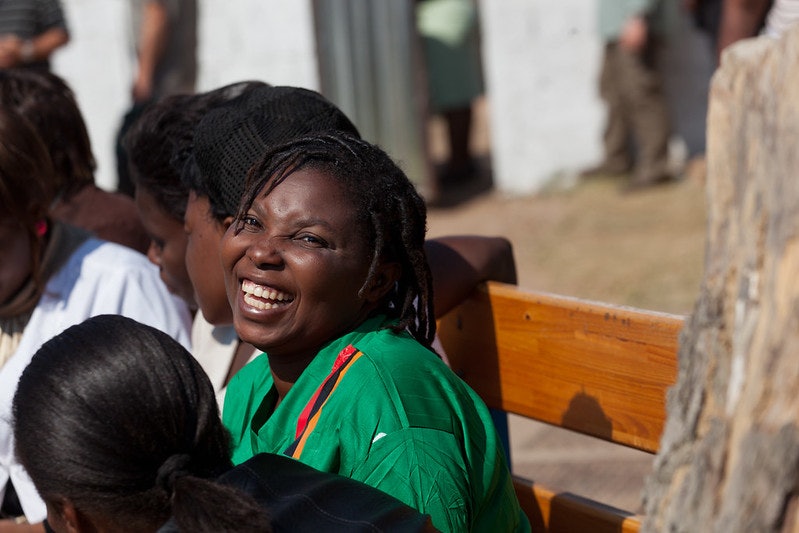A North Korea Freedom Scholarship recipient shares her story on escaping North Korea and her dreams and ambitions for her new life in the United States.
To help North Korean escapees pursue higher education and build productive, prosperous lives as new Americans, the Bush Institute awarded eight recipients the North Korea Freedom Scholarship. The scholarship will support escapees pursuing a range of educational opportunities at a variety of post-secondary institutions, including traditional four-year university programs, community colleges, and trade and vocational schools.
Below is the story of one of the recipients, O.S.H. O.S.H. has requested to remain anonymous, as leaving North Korea without permission is a crime, and violators and their immediate relatives may face imprisonment or punishment. The interview was conducted by Bush Institute Human Freedom Intern Jeff Kim.
Why did you escape North Korea?
I escaped from North Korea when I was 17 right after I graduated High School and my escape was already kind of planned by my mother. When I was 10 my mom started telling me that I don’t belong in North Korea, and that one day I would grow up and leave. So from a young age I felt like I didn’t belong in North Korea, and right after I graduated from High School I told my mom I was ready to escape.
Resources:
Escaping North Korea and Finding Freedom
North Korean Escapee Explores the World
Improving the Human Condition in North Korea. Defining a New Path Forward.
Human Rights Still a Missing Piece of the North Korea Puzzle
Why did you choose to come to United States?
I was raised by a single mother and my mom would always tell me I had two different opportunities: One, to live in a big place, which will be difficult because you may not have anyone to lean on. Option two is a small place with friends and family to lean on. But my mom taught me to choose the big place with difficulties because it’s going to help open your eyes and things in a different way.
That was kind of the first reason I chose the United States. Comparing South Korea and United States, I never been to U.S., I feel like it was the biggest country in the world and based on what my mom taught me I chose U.S. The second reason is I met a South Korean missionary in China, who helped me through all kinds of situations. He immigrated to Australia when he was 25 and he had experience living in the U.S. So he is a South Korean guy, but he knows a lot about the world, so he told me that he knew my personality well and knew what kind of dream I had, so he also had an impact on me choosing U.S instead of South Korea.
What was education like in North Korea?
I think education in North Korea was more than 60 percent about the history of Kim il-Sung and Kim Jung-il and all the Kim family. Then 40 percent of the education was math, science, and general stuff. So the things I learned from school was that North Korea was the greatest country in the world and our country leader is the most amazing person in the world.
But, later when I grew up the reality was completely different from what I was taught in school. No freedom to ask, no freedom to go, and just completely different from what was taught. So, education in North Korea is focused on the history of the Kim family, but education here in America is more focused on what I want to do, what my interest is, and what I am going to do for the society.
Why is education important to you?
I think education helps me look at things in a different way, treat people in a different way and helps me to grow up in a healthy way.
Why did you decide to study Christian Theology? What are your long-term goals?
I personally met my God when I was in China through the South Korean Missionary and I met a lot different people in China, but never met someone like the South Korean Missionary. So I saw something different in their life style and the way they help other people, it was completely different. So, I was curious why they live that way and then the missionary told me because of Jesus. So I said if the Jesus that you believe makes you live in a different way, I want to believe that Jesus and I made a promise to my God that if you give me an opportunity in the U.S. I will study Christian Theology first. Personally, I believe loving people is more important than making a lot of money.
Are there things you want to do to improve the situation in North Korea?
So I want to take into account everything I learn in America and later on if North and the South get united then I can teach and show them what I learned from here.
What was the biggest challenge adjusting to daily life?
Learning the language was the hardest part, understanding other people who grew up completely different from me, and the culture difference.
What is your day-to-day life like and what do you do for fun?
I am kind of an outgoing personality, so even if I don’t understand English I go out with people to better my English. So, I think now I have more confidence to talk with more people and share my story.
I go biking a lot, I currently live in an area with beautiful parks. Also, I am focused on being healthy, I wasn’t healthy when I was 17 so I have been focused on making my health better. Reading, hanging out with friends, and I really like to go do a lot of volunteer work.
Jeff Kim is a Human Freedom Initiative intern at the Bush Institute.































